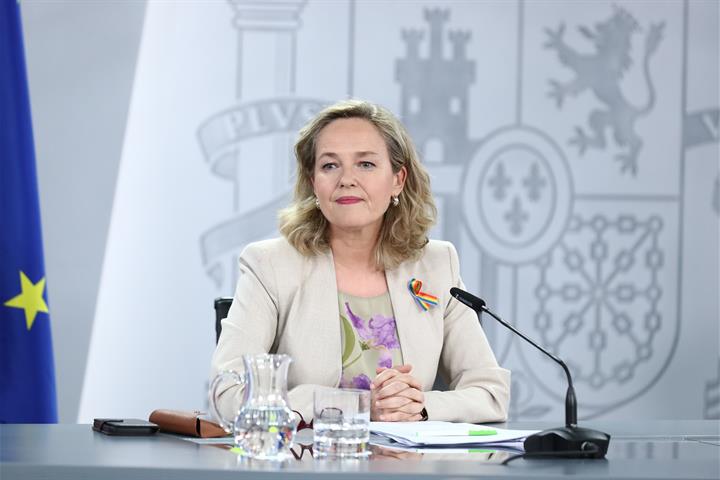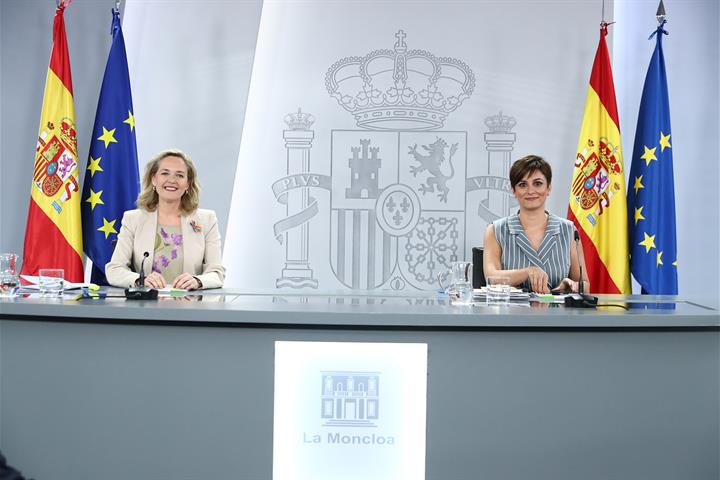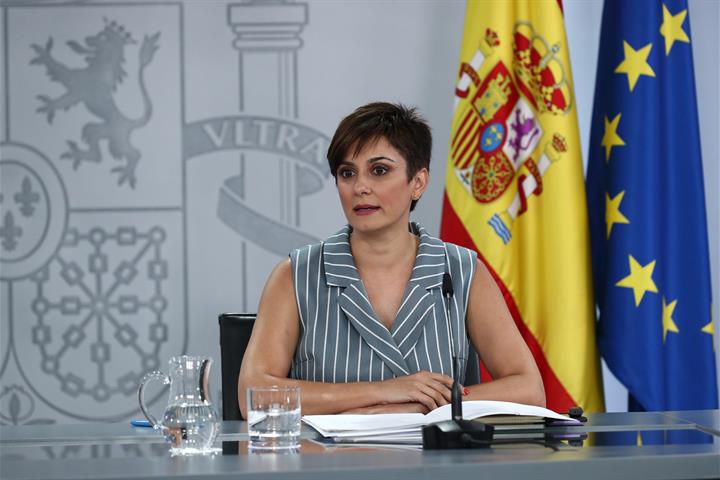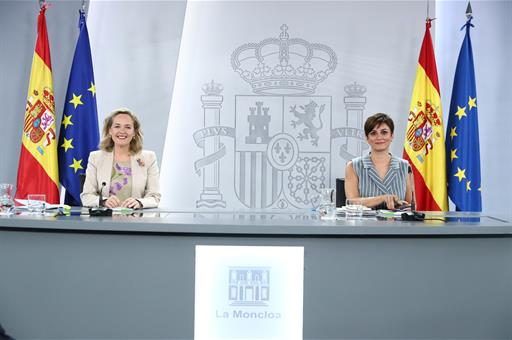Council of Ministers
The Council of Ministers extends the main measures in response to the consequences of the war in Ukraine
Council of Ministers - 2023.6.27
Moncloa Palace, Madrid
The Council of Ministers approved a package of measures to be implemented in the second half of the year to further respond to the impact of the war in Ukraine.
The First Vice-President of the Government of Spain and Minister for the Economy and Digital Transformation, Nadia Calviño, stressed that this is the seventh package of initiatives for this purpose and said that these actions "have been very effective in lowering inflation and supporting families and businesses in a context of such uncertainty as the one we are undergoing".
Calviño stressed that Spain is the fastest growing large European economy, at a rate four times higher than the average, thanks largely to the strength of job creation, investments financed with European funds and exports. She also described the Executive's fiscal policy as "responsible", which has allowed it to "comfortably" meet its deficit and public debt reduction targets.
In light of the evolution of the war, the Government has today extended the main support measures for the groups and sectors most affected by the price rises, and has also transposed several European directives and adopted additional initiatives to deploy strategic projects and programmes of the Recovery, Transformation and Resilience Plan. "It will allow us to move calmly and confidently through the second half of the year in a context of uncertainty, but naturally with the hope that this war will end as soon as possible," said the vice-president.
Extension of measures to support and protect the most vulnerable
Among the measures extended until 31 December are the subsidised public transport pass to alleviate the finances of families, students and the self-employed and to promote sustainable transport; the elimination of VAT on basic products and the reduction to 5% for oils and pasta; and aid for diesel for professional hauliers and farmers and stockbreeders (the subsidy will be 10 cents per litre until 30 September and 5 cents per litre in the last quarter of the year).
In addition, direct aid is added for those road transport professionals who are not subject to professional diesel and, therefore, do not benefit from this reduction, as well as for maritime transport services of public interest.
 The First Vice-President of the Government of Spain and Minister for the Economy and Digital Transformation, Nadia Calviño, during her speech at the press conference after the Council of Ministers | Pool Moncloa / Fernando Calvo
The First Vice-President of the Government of Spain and Minister for the Economy and Digital Transformation, Nadia Calviño, during her speech at the press conference after the Council of Ministers | Pool Moncloa / Fernando Calvo
The Minister for Economy and Digital Transformation has indicated that several of the energy measures "that have been very effective in reducing electricity bills" have also been extended, and the limit on the maximum selling price of butane canisters has been maintained.
The measures to support the island of La Palma related to social security, employment and mortgages are also extended.
This set of actions will mobilise an additional 3.8 billion euros, according to Nadia Calviño. "We are talking about total aid, including tax cuts, direct aid and subsidies, of 8.9 billion euros in the second part of the year. In total, the seven approved packages mobilise more than 47 billion euros in response to the impact of the war", she explained.
Together with these fiscal impact measures, the protection of vulnerable groups is strengthened, extending the suspension of evictions for vulnerable people without housing alternatives and the prohibition of dismissals due to the rise in energy prices in companies that receive public aid. In addition, the "right to be forgotten" is adopted for people who have suffered from cancer when contracting any product - financial or otherwise - five years after overcoming the disease without a subsequent relapse.
Transposition of directives and regulation of VTC licences
A second group of measures approved today transposes directives that have already expired or adapts the Spanish regulatory framework to EU rulings.
The aim, according to Calviño, is to incorporate the directives on structural modifications of commercial companies, reconciliation of family and professional life for parents and carers, the fight against the dissemination of terrorist content online and the prevention of money laundering and the financing of terrorism, among others.
In addition, the Executive has adapted the legal regime for car hire services with a driver, known as VTC, to European jurisprudence this year. The first vice-president pointed out that the main new features, which have been worked on with the sector, consist of requiring the VTC authorisation holder to own or lease the vehicle for a period of more than three months; increasing the requirements regarding the reduction of CO2 emissions; supporting the declaration of taxis as a public interest service, with more demanding quality requirements; and granting new tools to regional governments and local entities to limit authorisations and organise the passenger transport service in accordance with good operation, traffic management and environmental considerations.
First-time home buyer guarantees and tax incentives
 The Government Spokesperson and Minister for Territorial Policy, Isabel Rodríguez, and the First Vice-President of the Government of Spain and Minister for the Economy and Digital Transformation, Nadia Calviño, during the press conference | Pool Moncloa / Fernando Calvo
The Government Spokesperson and Minister for Territorial Policy, Isabel Rodríguez, and the First Vice-President of the Government of Spain and Minister for the Economy and Digital Transformation, Nadia Calviño, during the press conference | Pool Moncloa / Fernando Calvo
A third section covers urgent initiatives to effectively deploy strategic projects and programmes financed with European 'NextGenerationEU' funds.
Among them, the launch of the new line of guarantees from the Official Credit Institute (ICO) to help young people under 35 and families with dependent children to pay the deposit on their first home; measures to facilitate investment in the strategic project related to semiconductors and microprocessors; the amendment of the General Law on Subsidies to clarify the application of measures to combat late payment on commercial transactions, providing certainty to companies on how to accredit compliance with payment deadlines and, therefore, how to access aid programmes and public contracts; and measures to stabilise public employment and delay the obligation to pay contributions for internship contracts.
Nadia Calviño has indicated that two new deductions of 15% are envisioned in Personal Income Tax for the purchase of electric vehicles and the installation of battery recharging systems for electric vehicles. The maximum deduction that can be applied from the time of acquiring the vehicle is 20,000 euros. "The aim is to consolidate the investments underway in our country for the modernisation of the vehicle industry, within the framework of the so-called PERTE VEC, so that Spain is at the forefront of the roll out of electric and connected vehicles in Europe", she said.
In relation to corporation tax, a tax incentive is introduced to promote recharging facilities, both for private use and those accessible to the public, and the administrative procedure for installing recharging infrastructures up to 3 megawatts, compared to the current 250 kilowatts, is simplified.
In addition, renewable energy communities are introduced and the deadline for renewable energy projects in the pipeline to obtain construction authorisation is extended by six months.
Energy transformation
The Council of Ministers has addressed the update of the Integrated National Energy and Climate Plan (PNIEC) 2023-2030, which develops the energy transformation policy and fulfils the commitments made with the European Union.
The Minister for Territorial Policy and Government Spokesperson, Isabel Rodríguez, said that this marks the start of the public consultation process for the PNIEC, with the aim of finalising it by June 2024. Rodríguez stressed the importance of this initiative in attracting investment and removing uncertainties, as well as the social benefits it brings, from the renovation of homes and the commitment to self-consumption to new employment and training opportunities.
Investments in science and infrastructure
 The Government Spokesperson and Minister for Territorial Policy, Isabel Rodríguez, during her speech at the press conference after the Council of Ministers | Pool Moncloa / Fernando Calvo
The Government Spokesperson and Minister for Territorial Policy, Isabel Rodríguez, during her speech at the press conference after the Council of Ministers | Pool Moncloa / Fernando Calvo
The Executive has approved two new calls for proposals under the R&D Missions programme, which brings together companies and research organisations to coordinate the country's scientific capabilities and respond to society's everyday challenges. The bodies involved this time are the Centre for Technological Development and Innovation (CDTI) and the State Research Agency, with 70 and 60 million euros of investment, respectively. Applications will be open from 3 to 28 July.
The Government Spokesperson explained that the research priorities of these Missions are related to the foundations of economic transformation. Specifically, it is a commitment to new technologies, such as artificial intelligence; information security and cybersecurity; energy transition; the development of an advanced and sustainable agri-food and livestock sector; advanced management of water resources; and technology for preventing and fighting forest fires.
Also in the chapter on investment, the Council of Ministers has earmarked 293 million euros for the conservation of more than 2,000 kilometres of roads. The goal, according to the Minister for Territorial Policy, is to reduce emissions and guarantee optimal traffic conditions, with viability and safety.
Commitment to LGBTI rights
On National LGBTI Pride Day, which is celebrated on 28 June, the Government has issued an institutional declaration reiterating its commitment to the rights of the LGBTI community and to the eradication of any form of discrimination based on sexual orientation, gender identity or gender expression.
"LGBTI Pride is also the pride of a country, Spain, of an inclusive and respectful society that values difference as the basis of our wealth", said the Executive's spokesperson.
Non official translation





